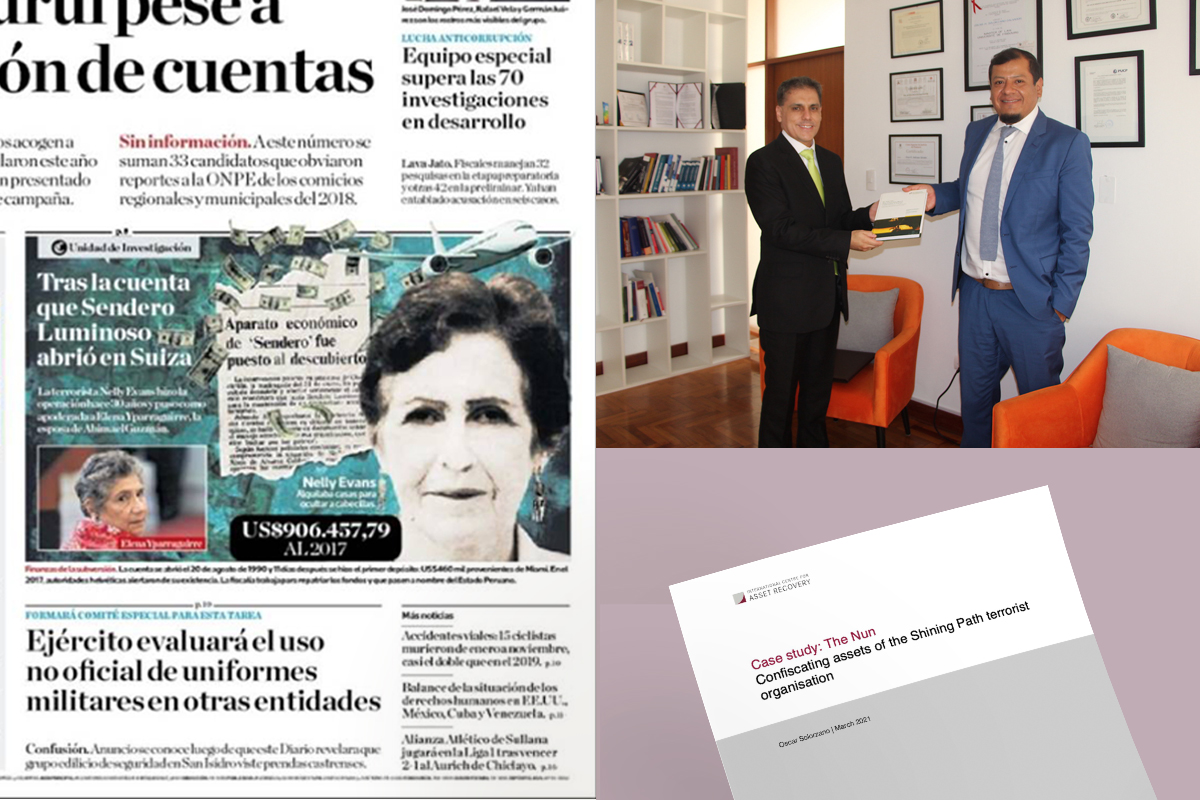Confiscating assets of the Shining Path terrorist organisation in Peru: case study and words from the prosecutor

Technical assistance from the Basel Institute on Governance in a landmark case of non-conviction based confiscation in Peru has enabled the successful confiscation of around one million dollars linked to terrorist financing.
Led by Prosecutor Carlos Salas Bustinza, the case involves Nelly Marion Evans Risco, a British-Peruvian woman known popularly as “The Nun”. As well as a committed Catholic, Evans was a member of the Shining Path (Sendero Luminoso) terrorist organisation. The group’s violent acts in the 1990s are estimated to be responsible for over 60,000 deaths, mostly of peasants and indigenous people.
In January 2021, the Peruvian State successfully concluded non-conviction based confiscation proceedings intended to recover around one million dollars in illicit assets held by Evans in a Swiss bank account since 1990. At this time, the Peruvian judgement is still pending execution in Switzerland.
Learn more about the case background, legal strategy and conclusion in an in-depth case study by Oscar Solórzano, "The Nun – Confiscating assets of the Shining Path terrorist organisation". Oscar Solórzano is Head of Latin America at the Basel Institute and the Senior Asset Recovery Specialist who led the technical assistance in this case and many others, with the support of his local team.
Insights from the prosecutor
In an exclusive interview, Dr. Carlos Salas, Head of the Fifth Specialised Public Prosecutor's Office for Extinción de Dominio, told us:
"The Evans case represents a crowning achievement for the Public Prosecutor's Office. In its commitment to democracy, it aims to succeed in and never give up the fight against economic crime. Achieving this means recovering assets from national and transnational criminal organisations.
This landmark judgement goes some way to providing the reparations that the Peruvian State deserves, almost three decades after being thrown into turmoil by a terrorist organisation.”
The case was launched thanks to information transmitted spontaneously by Switzerland to the Peruvian authorities. Since a criminal conviction was not possible, the legal strategy developed with the support of the Basel Institute made use of the mechanism of extinción de dominio, a form of non-conviction based confiscation law common in Latin America. The Swiss authorities seized the account while the case proceeded in Peru.
Although the spontaneous transmission of information and subsequent freeze of the account in Switzerland were of critical help, significant challenges remained in pursuing the case. Prosecutor Salas explained:
“One challenge was the long period of time since the account was opened in 1990. After 30 years, the financial system did not have any information that would allow us to determine where the funds originally came from.
This has not been an impediment – on the contrary, it has forced us to be more creative and to take advantage of the new law of extinción de dominio. Unlike criminal proceedings, it is an autonomous procedure that does not require a previous conviction. It merely requires determining, through direct or circumstantial evidence, that this property is of illicit origin or destination.
Our office therefore undertook to collect evidence to prove that the funds in the Evans account constituted the object of illicit activities or crimes directly related to the financing of terrorism.”
With the support of the Basel Institute, Prosecutor Salas formally filed the injunction on 23 July 2020. The final judgement was handed down on 9 January 2021. Thanking Oscar Solórzano and the team, Dr. Salas commented:
"The work of the Basel Institute on Governance has been key to achieving this judgement. From the very beginning, they helped us with the drafting and focusing of the case.
The Basel Institute acted as a bridge between Peru and Switzerland, helping to determine the current legal situation of the account. We sincerely hope to continue working together."
Now that this emblematic case has been won in the Peruvian judicial system, it is up to Switzerland to execute the judgement and return the illicit assets. Dr. Salas is hopeful:
"It is not the first time that Peru and Switzerland have cooperated effectively on precedent-setting cases of asset recovery. So far, we have been able to overcome any challenges very well. I hope that in the coming months we will be able to celebrate the repatriation of the assets from Switzerland to Peru."
A collaborative effort
The Basel Institute’s support in this case and others is provided through its International Centre for Asset Recovery in collaboration with the Swiss SECO-funded Strengthening Subnational Public Finance Management programme.
Oscar Solórzano would like to thank the entire team and in particular Dr. Salas for his openness, courage and competence in prosecuting this case.


